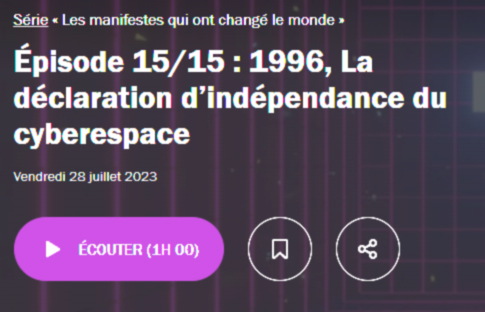Declaration of independence for cyberspace
We touched on the independence of the Web in an article on the genesis of "Metavers", and the podcast linked below is a good complement for those who want to know more about these concrete and effective struggles. This aspect of (cyber)culture, a dream of the hippy-techno libertarians of the 1990s, is little known in France, where hardly anyone has been aware of these struggles since the beginnings of the Internet (sic - Yannn Minh).
"Governments of the Industrial World, you weary giants of flesh and steel, I come from Cyberspace, the new home of Mind. On behalf of the future, I ask you of the past to leave us alone. You are not welcome among us. You have no sovereignty where we gather."
- John Perry Barlow, A Declaration of the Independence of Cyberspace
For the American John Perry Barlow, in the 90s, the Internet was going to change the world. He was right: digital civilization has become our ubiquitous reality. But at what price? Hasn't the libertarian and emancipatory utopia been privatized and hijacked by GAFAM, the Internet giants?
Podcast on this declaration of independence in cyberspace.
The Declaration of Independence for Cyberspace is a famous text written on February 8, 1996 in Davos, Switzerland, by John Perry Barlow, writer, activist and co-founder of the Electronic Frontier Foundation. It supports the idea that no government (or any other form of power) can impose itself and appropriate the Internet, created six years earlier and still in its infancy and in full expansion at the time.
It was written partly in response to the passage of the TelecommunicationsAct of 1996 in the USA - then under Bill Clinton. The Communications Decency Act (CDA), incorporated into the Telecommunication Act, aimed to censor certain offensive and pornographic content, making it illegal and punishable by a $250,000 fine to, for example, say "shit" online, talk explicitly about abortion, or refer to various bodily functions in anything other than strictly clinical terms, thus tending to limit certain freedoms on the Internet.
Because of its subject matter, this declaration became famous within the first few weeks of its publication, and is still popular on the Internet today. As for the part of the Telecommunications Act concerning expression on the Internet (CDA), the loud cries of Barlow and other defenders of civil liberties bore fruit: in June 1997, after several months of legal wrangling, the Supreme Court ruled that it was incompatible with the First Amendment of the US Constitution.
Find out more about METAVERSE :

💡 A credo: simplify life for 360° content producers with a universal "NoCode" tool that transforms images or videos into truly interactive immersive experiences!
🏁 My first brand, subOceana, was born in "a" metaverse, in 2007... 👂 And already with this idea: putting technology at the service of meaning and the human.
🏷 I've never really liked labels, headings, categories or other drawers: every community has its own language, every profession its own jargon, and depending on the world you're in or the people you meet, what makes sense 🧑🎓 in one case can turn out to be completely ridiculous 🥳 or outdated in another.
🤩 What I really like: spending hours testing, twisting tools, breaking established habits. Innovating*, not necessarily to make something new, but to make tech invisible and put it at the service of those who need it. Like when you spend time cooking a complicated dish, having in mind the pleasure of simplicity and conviviality 🥂 that will follow.
It's this technological conviviality that I seek to cultivate. And that's what we transmit at explorations360.
🕵♂️🕵♀️👨🚀👩🚀👨🚒👩🚒👷♂️👷♀️👨🎨👩🎨👨💻👩💻 A customer (ours are professionals), who can easily appropriate technology (in this case, virtual reality) and let it take a back seat to the experience and the message, will use it to increase their ability to create, train, communicate, share and inspire their own audience.
Virtual reality must not impress. It must transform.
At explorations360, we help hospitals, manufacturers, cultural players and training organizations to engage their teams, train effectively and pass on knowledge in new ways.
Thanks to a simple yet powerful platform, we have already helped more than 100 organizations create customized immersive experiences:
- Industrial safety courses
- Care habituation for the disabled
- Interactive cultural tours
- Experiential & inclusive tourism
- Immersive training for the food industry
What sets us apart?
- Our integrated production, scripting and support capabilities
We believe that technology should be replaced by the message.
==》You want to transform the way you train, communicate or raise awareness?
Contact me via the form or book an appointment via the DEMO button.
*Innovating: talking 6 months before others about things... that we've been doing for 10 years to general indifference, sometimes tinged with a little mockery 😉



